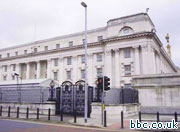The High Court in Belfast has ruled that abortion laws in Northern Ireland are “incompatible” with human rights legislation.
The judicial review on allowing abortion in cases of sexual crime and severely life-limiting conditions was brought by the Northern Ireland Human Rights Commission (NIHRC).
But the law has not yet changed in the Province. It remains to be seen if the judgment will be appealed and what long-term effect the case may have.
Disappointed
Mr Justice Horner asked for further submissions from the parties involved on whether current legislation could be read in such a way as to allow abortions in cases of sexual crime and fatal foetal abnormalities.
In response to this evidence the judge may issue a declaration of incompatibility under the 1998 Human Rights Act.
The Attorney General John Larkin QC said that he is “profoundly disappointed” by the decision.
Misdiagnosis
Currently in Northern Ireland abortion is only allowed if the mother’s life is at risk.
The judgment did not take into account the possibility of misdiagnosis in the womb, or the fact that children diagnosed with fatal foetal abnormalities can live for a short time after birth.
In cases of sexual crime, not letting the mother have an abortion places a “disproportionate burden” on her, the ruling said.
Discrimination
Mr Justice Horner also said it would be discriminatory to have different abortion limits for babies expected to be born with a disability.
In Great Britain, the legal limit for abortion is 24 weeks, but if the child is disabled abortion is allowed up to term.
During the judicial review hearing in June, Larkin told the court that the NIHRC wants to “take away the right to life of disabled unborn children”.
Floodgates
And Brett Lockhart QC, representing Roman Catholic bishops’ concerns, warned that a change in the law could “open the floodgates for every type of disability” and said that abortion is not the answer.
The Department of Justice has carried out a consultation on allowing abortion in cases of sexual crime and fatal foetal abnormalities.
Despite the vast majority of respondents being against any change in the law, Justice Minister David Ford said he would ask for approval to bring forward a Bill to permit abortion for fatal foetal abnormality.
Rejected abortion
The Christian Institute’s Choose Life series shares moving stories of people who have rejected abortion.
Bonnie and Phil Walker’s daughter Grace was diagnosed with the severely life-limiting condition anencephaly. She died 15 minutes after being born.
They had been told it was not a “viable” pregnancy and were offered an abortion.
But Phil described the 15 minutes they spent with their daughter as “15 minutes of pure love”, with Bonnie affirming: “There’s a purpose for every life, no matter how short”.

